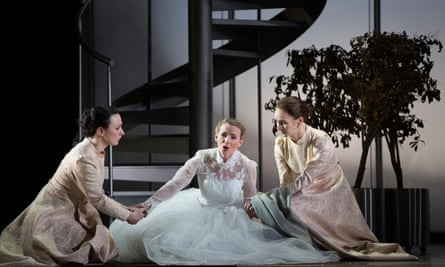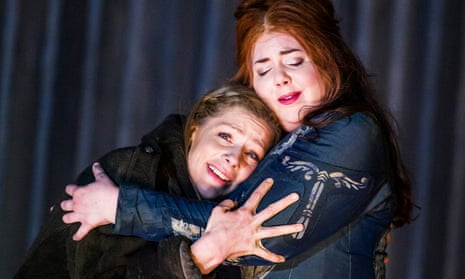Wagner was a fan. So too were Chopin and Liszt. Schopenhauer called the opera the perfect tragedy. It is also one of the biggest challenges in the repertoire. Bellini’s 1831 masterpiece Norma, about a druid priestess who has broken her vows of chastity in her love for a feckless Roman, is above all a vehicle for the “beautiful voice” – bel canto – and a powerful study of human psychology. The Italian composer, whose career ended with his early death at the age of 33, is said to have compared the act of creating an opera to vomiting blood. This savage metaphor, whether Bellini’s own words or not, reflect the urgency of feeling expressed in Norma.
The crux of the drama occurs far into the first act – the opera’s opening is ponderous – when a young priestess, Adalgisa, comes to Norma to confide that, against the rules of the faith, she loves a man. She is unaware that Norma herself, the head of the community, has shared that experience too and, in secret, borne two children. The exchange turns from womanly empathy, wonderfully captured at great length, to frenzy and horror when Norma realises Adalgisa is talking about her own lover, Pollione, Roman proconsul in Gaul. The musical colours are raw but the emotions conveyed, in all their extravagance, are subtle and nuanced: the man himself walks in to find himself caught between nemesis and a black hole. It is all so multiply illicit you cannot even call it adultery.
In its first staging of Norma in its 85-year history, English National Opera has secured two magnificent singers for these ambitious female roles: in the title part, the thrilling young American soprano Marjorie Owens has the voice, musicality, stamina and stage presence to match the many who have excelled before her, from Maria Callas to Cecilia Bartoli. Owens spun the long lines of her showpiece aria, Casta Diva – “Virgin Goddess” in George Hall’s unfussy new translation – with strength and grace. As Adalgisa, the American mezzo Jennifer Holloway was an ideal foil, rich and burnished in tone, serene in presence. The British tenor Peter Auty transmitted the necessary flaccidity of character for Pollione, with skilful use of his powerful voice. James Creswell, Valerie Reid and Adrian Dwyer were strong in smaller roles.
Stephen Lord, conducting, offered a firm pair of hands, letting the music breathe but never droop (easy to do in the endless undulating accompaniments), and the ENO orchestra shone. Christopher Alden’s stark, part-stylised staging, designed by Charles Edwards, with costumes by Sue Wilmington and lighting by Adam Silverman, was first seen at Opera North in 2012. The enclosed wooden barn suggests an American rural community, Amish or Anabaptist, high on strictures, low on fun. All is dominated by a dead tree trunk erect with symbolic purpose. The visual drabness worked, intensifying the suffocating atmosphere and focusing attention on the score: Bellini defies easy dismissal and forces you to rethink and listen repeatedly. Here, there was certainly not much to look at.
The reception was mainly enthusiastic, particularly for Owens and Holloway. Equally rousing were the cheers for the incomparable ENO chorus, whose future is threatened as part of the company’s ongoing cuts. Its 44 members are currently being balloted on whether to take industrial action. A result is due this week. A Save English National Opera petition, signed by many leading figures in opera, has reached 5,700. (Another, set up by Equity, has almost 5,000 signatures.) A proposed 25% reduction in contract and consequent pay cut, together with four redundancies, are still being negotiated.
There are two highly contentious points, among many unresolved issues. One is the degree to which singers would be truly free to work as they choose in their three-month “off contract” period. A fear is that notice periods – which may be as long as two or three years – could see chorus members obliged to remain available for ENO work that does not materialise. A second issue is whether, if working for any additional ENO enterprise, chorus singers would maintain their usual rate of pay (a drop of 50% has been mentioned). These matters were under negotiation at the time of going to press.
Fresh and handsome to look at in Yannis Thavoris’s designs – modernist brushed steel and glass, effective use of a spiral staircase and potted orange trees, which bloom, die and are replanted – Harry Fehr’s staging of Handel’s Ariodante for Scottish Opera takes liberties but reaps rewards. (The same team created the well-received Orlando in 2011.) Some cuts, with six new passages based on Handel’s original sketches “constructed” by the head of music, Derek Clark, will startle purists but resulted in a clear telling of one of the composer’s most immediate and, finally, joyful operas.

Fehr has updated the action to an unnamed, snow-frozen, mountainous land ruled by a military regime where state and church are hand-in-glove. Conductor Nicholas Kraemer led a mostly vigorous performance – there were lovely solo passages from the Scottish Opera orchestra, who played in period style but felt slightly oversized – with star performances from Sarah Tynan (Ginevra) and Caitlin Hulcup (Ariodante). There was excellent support from all, including a slippery-footed, snarling Xavier Sabata (Polinesso), a sterling, vibrant Ed Lyon (Lurcanio) and a glowing, intelligent Jennifer France (Dalinda), a Scottish Opera emerging artist and a star in the making. With these singers, this long opera flew by.
Star ratings (out of 5)
Norma ***
Ariodante ****

Comments (…)
Sign in or create your Guardian account to join the discussion